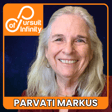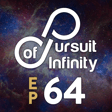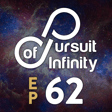Become a Creator today!Start creating today - Share your story with the world!
Start for free
00:00:00
00:00:01

4. The Ross-Barger Philosophy Inventory
In this episode, we take the Ross-Barger Philosophy Inventory quiz/test. This was a really fun one! We went deep into each question and explored many philosophical paradigms. Follow along with the link below.
https://paolotormon.github.io/ROSS-BARGER-Philosophy-Inventory/?ref=https://githubhelp.com
_________________
Music By Nathan Willis RIP
Follow Pursuit Of Infinity:
www.PursuitOfInfinity.com
Discord: https://discord.io/pursuitofinfinity
YouTube: https://www.youtube.com/channel/UCPpwtLPMH5bjBTPMHSlYnwQ
Spotify: https://open.spotify.com/show/58he621hhQ7RkajcmFNffb
Apple Podcasts: https://podcasts.apple.com/ca/podcast/pursuit-of-infinity/id1605998093
Instagram: https://www.instagram.com/pursuitofinfinitypod/
Patreon: Patreon.com/PursuitOfInfinity
Transcript
Introduction & Philosophy Quiz Overview
00:00:01
Speaker
Hello and welcome to the Pursuit of Infinity podcast. We have a fun episode for you today where Joe and I take on the Ross Barger philosophy quiz. So this is a cool little quiz created by Ross-Barger. I believe that's two separate people. Copyright 1999 by Robert N. Barger.
00:00:23
Speaker
So this quiz essentially asks you 40 questions and assigns each question a particular mode of philosophical thought. These modes include idealism, realism, pragmatism, and existentialism.
Engagement & Participation Encouragement
00:00:42
Speaker
So in this episode, we go through each question, we break it down,
00:00:46
Speaker
We discuss what the wording means to us, and then each of us answers agree or disagree. And at the end, we tally up all of our scores, which gives us a point value for each of these modes of philosophical thinking.
00:01:03
Speaker
We really had a lot of fun with this one and I hope you guys all enjoy it. If you'd like to follow along below in the show notes, I will include a link to the quiz. I would suggest printing it out and writing your answers on it because it's a little bit archaic in the way that it's laid out, but it's still really cool and it's very beneficial. We learned a lot about ourselves and had a lot of fun in the process.
00:01:28
Speaker
But before we get to the quiz, I would just like to request that if you feel so inclined to please visit our Patreon at patreon.com slash pursuit of infinity. And we're also on Instagram at pursuit of infinity pod. And please, if you also feel so inclined, we would like to ask that you give this podcast a five star rating on whichever platform you listen on. And with that.
00:01:58
Speaker
I hope you enjoy the show.
Philosophical Modes Explained
00:02:24
Speaker
Everyone. So today we have the Ross Barger philosophy inventory quiz that we're going to be taking. So the directions are to respond to each question in the space provided. We have these printouts here, um, either agree or disagree to 40 separate statements. Uh, the key to scoring is going to be found at the end of the answer page.
00:02:46
Speaker
And what it's going to do is it's going to break up our philosophical answers into four different ideas or idea paradigms. So the first one is idealism. Idealism identifies and describes the metaphysical perspectives which assert that reality is indistinguishable and inseparable from human perception and understanding.
00:03:13
Speaker
It's kind of like the reality is a mental construct that's closely connected to your ideas. Idealist perspectives are often in two categories. Subjective idealism, which proposes that material objects exist only to the extent that the human being can perceive it. And there's also objective idealism, which is
00:03:34
Speaker
purposes the existence of an objective consciousness that exists prior to and independently of human consciousness. Thus, the existence of the object is independent of human perspective. That one sounds a little bit like I might be, might get some of that going on. Yeah. Yeah. I definitely feel like the metaphysical part and the reality being indistinguishable from human perception and understanding is definitely going to ring true for both of us. Yeah.
00:04:02
Speaker
All right, is that that's all for idealism? Yeah, so the next one I feel like this might be one of the ones that we know bueno. Yeah, no bueno It's realism. So this view Yeah, right Realism is a view about the properties of reality in general holding that reality exists independently of the mind as opposed to non realist views Like some forms of skepticism and solipsism Okay, which question?
00:04:33
Speaker
the certainty of anything beyond one's own mind. Philosophers who profess realism often claim that truth consists in a correspondence between cognitive representations and reality. So there's a, yeah, I see a little bit of that. Okay. So I bet I have a feeling that I'm going to get something away different than I suspect.
00:04:54
Speaker
Yeah, this might be really interesting actually. Um, so then the next category is pragmatism. So pragmatism is a philosophical tradition that considers words and thoughts as tools and instruments for prediction, problem solving, and action, and rejects the idea that the function of thought is to describe, represent, or mirror reality.
00:05:14
Speaker
Pragmatists contend that philosophical topics such as the nature of knowledge, language, concepts, meaning, belief, and science are all best viewed in terms of their practical uses and successes. I think that's the main key point of pragmatism. Yeah, I completely agree with that too.
00:05:31
Speaker
I kind of agree with all of this already, so I'm kind of confused what I'm going to get here. So the last one is existentialism, which is something I love too. It's a form of philosophical inquiry that explores the problem of human existence and centers on the experience of thinking, feeling, and acting. In the view of an existentialist, the individual starting point has been called the existential angst
00:05:56
Speaker
a sense of dread, disorientation, or confusion or anxiety in the face of apparently meaningless or an absurd world. Existentialist thinkers frequently explore issues related, relating to the meaning purpose and value of human existence.
Quiz Begins & Philosophical Debates
00:06:11
Speaker
So to me, it's like a meta analysis of human existence or something like that. Okay. Yeah. I already feel like I identify at least a little bit with all those. So.
00:06:21
Speaker
Yeah, so I'm curious where the percentages are going to lie. All right. So are you ready? Do you want to begin? Yeah, we can begin. All right. You want me to read the first question? Yeah. Okay. Number one, learning is a process of interacting with people and things around us. It leads to new understandings, which can then be used to solve social problems.
00:06:44
Speaker
Okay. Interesting. So learning is a process of interacting with people and things around us. It leads to new understandings, which can then be used to solve social problems. So now we're going to agree or disagree. I mean, I think I agree with that statement. I mean, because
00:07:07
Speaker
Learning is a process of interacting with people and things around us. Like that's exactly what learning seems to be. It's like you observe something and then you, you, you take whatever knowledge you can form around it from it. And it can be used. This is where I think the pragmatist part comes in, uh, being used to solve social problems.
00:07:26
Speaker
So that's interesting because I agree. I think I'm on the same page with you. I think learning is a process of interacting with people and things around us. That's clearly true. But the second part is intriguing because it says it leads to new understandings which can then be used to solve social problems.
00:07:47
Speaker
Should solving social problems be inherent to... Yeah, I think I do agree with this because it says that it leads to new understandings which can then be used to solve social problems. I think that has to be true. It doesn't say which must then be used, you know what I mean? I mean, new understanding can.
00:08:10
Speaker
I mean, I'm not trying to be too picky with the, every word, but I think, I think I'm with you there. I think I agree with this. All right. So yeah, it is agree. And also there's going to be a link in the description here for this particular quiz. So if anybody wants to follow along and answer for themselves and compare their results to what we got, I'm going to definitely post, uh, in the show notes, a link to this particular test. Yep. Learn a little bit about yourself.
00:08:38
Speaker
So question number two, the human person is primarily a nervous system, which is influenced by interaction with the physical environment along lines recognized by science. Okay. I think you know what I'm going to say on this. I think it's an easy disagree just because of the word primarily. Yeah, I disagree. And.
00:09:00
Speaker
Primarily, I do not think a human person is primarily a nervous system at all. Um, I mean, we have a nervous system, but I'm going to go disagree. What do you disagree with about that? Yeah, I really think the word primarily is the difference maker there because yeah, like you said, we have a nervous system and it is influenced by interaction with the physical environment. But to say that the human person is primarily a nervous system.
00:09:25
Speaker
I don't, I'm going to disagree with that. And it goes to basically what we were talking about before we started the podcast. Uh, we're talking about consciousness a lot and all that. And based on what we were talking about, nervous system is not primary.
00:09:41
Speaker
Yeah. Yeah. I happen to agree. Yeah. All right. Now disagree for both of us. So far we're the same. Okay. All right. Number three. Education should lead a person to spiritual understanding. Um, you want to go ahead with this? Yeah. I think for me, this is an easy agree just cause true knowledge, true education.
00:10:06
Speaker
should definitely involve a person's spiritual development. I mean, obviously the current definition of education that we have within like, you know, Western civilized society is not that, but.
00:10:22
Speaker
Yeah, I'm gonna go with an agree on that one for sure. All right. Well, I will disagree. This is where we part ways now, okay? Education should lead a person to spiritual understanding. I don't like the word should there. I don't think education should. I think personally for me, I think it should, but I don't think as like a blanket statement, I don't agree with that.
00:10:47
Speaker
Okay, fair enough. I think spiritual understanding isn't for everybody necessarily. I think, I mean, a lot of people reject it, and I don't think every kind of education should lead to any spiritual understanding. Personally, I do agree with that for myself, but as a statement, that's a good question now, I'm thinking. Is this, how would I, would I answer that? Agree or disagree?
00:11:11
Speaker
because I think my education should lead to, you know what I'm saying? Well, since the question doesn't actually say or specify. It's talking about education. Yeah, I think it means like your overall outlook on what education should be. So with others as well.
00:11:27
Speaker
Actually, that's kind of interesting now because I'm with you in a sense that I do agree that that's Important but I don't you know what I mean when I'm saying the word should I don't think that it's a necessity or like I don't think it should be a necessity I think it should be like a personal choice like a you know what I mean well the way I see it is I
00:11:50
Speaker
If I'm going to value, like put a value system on education and its effectiveness in the world, I think that if it doesn't include spiritual intelligence in some way, shape, or form, then it's, it's ineffective. Yeah.
00:12:10
Speaker
All right, I'm gonna, I'm gonna actually agree. I'm still with you. I was kind of trying to maybe stray away, but I mean, I do feel strongly about this, but it's just the word should kind of, kind of threw me off a little bit, but I guess in a perfect world it should. All right, I'm gonna, I'm gonna agree. We're gonna, we're gonna get to some disagreements at some point here.
00:12:33
Speaker
All right. Number four, knowledge involves successful adaptation to our surroundings. Hmm. Knowledge involves successful adaptation to our surroundings. I think.
00:12:49
Speaker
I think I agree with that. Knowledge involves successful adaptation to our surroundings. Yeah, I'm going to agree with that because I don't really, I can't really pick out why I would disagree. I mean, it involves, it doesn't encompass, you know what I mean? Or it doesn't like, it doesn't say must or something like a definitive statement. It just says like.
00:13:12
Speaker
I mean, as human beings, that's like our ability to adapt is, you know, is what separates us from everything. Yeah. It's a big part of knowledge. We can survive everywhere. Um, yeah, I'm going to agree. Number four is agree. What about you? Yeah, I think I'm going to agree with that too. I just think that that's a statement that.
00:13:38
Speaker
the wording saying knowledge involves successful idea because yeah, involved is a word that I think you can't really deny it. Yeah. Yeah. That's like kind of, that's essentially human beings I'd say. Yeah. And successful adaptation, like the point of knowledge is in order is for you to, to be able to progress as a human. And if you can't adapt
00:14:03
Speaker
to your environment and your surroundings and how are you supposed to like continuously progress? So yeah, I definitely think that's going to be an agree. Okay. All right. We're both in agreement. All right. Number five. Knowledge is accurate if it reflects physical material reality. What do you think?
00:14:26
Speaker
I am going to give this one a disagree, I think, because its accuracy doesn't depend solely on physical and material reality. Knowledge is accurate if it reflects physical material reality. There are many types of knowledge and I don't think that all of them would adhere to that statement. I'd also disagree with this.
00:14:57
Speaker
Yeah, I think there's more to knowledge than just physical material reality. So number five will be a disagree. So, so far we're still in agreement on everything. Yeah, it looks like it. Okay. I'm not surprised. Uh, number six, the human person is basically a spiritual being. What do you have to say about that, Josh?
00:15:27
Speaker
I'm going to agree there because I think at our core, we are spiritual beings. Like the phrase, like I'm trying to get this right. We are spiritual beings having a human experience as opposed to we are human beings having a spiritual experience. I tend to alignment the first one. Totally agree with you. So we are both in agreement on that too.
00:15:52
Speaker
Yeah, we are spiritual beings. A lot of people don't know that. Um, it's interesting. I would like to see how a lot of how people answer these. Cause I mean, it's, to us, it's so, uh, it's so like natural cause we're very similar minded. You know, we're, we're gonna, we're gonna end up with probably something pretty close as a final answer here.
00:16:14
Speaker
Yeah. I'm really waiting for some of these questions to start to divide us. Yeah. Nice. If it does. Okay. So you're both in agreement on six. Yep. On six. Okay. Okay. So seven is the human person discovers knowledge from the physical material world. It doesn't say only, you know what I mean? I think the human person discovers knowledge from the physical material world.
00:16:41
Speaker
Uh, my initial inclination is to agree with that because like I said, it doesn't, it doesn't say only, you know, I mean, there's definitely knowledge to be learned from physical material world. Um, Hmm.
00:16:58
Speaker
I mean, yeah, you have to agree with that, right? I mean, I think you do because it's a true statement. It is. It doesn't say only. Yeah. It's not, uh, discounting anything else. I mean, physical material world is what we're experiencing right now. So.
00:17:16
Speaker
And to say that you can't acquire knowledge from that is not kind of insane. Yeah. It's an incorrect statement. So yeah, I think you kind of have to, we're going to both be free lists by the end of this. I know. Right. All right. So. All right. We both agreed that was number seven. Okay. Um, okay. Number eight. Knowledge is meant to be used. It is ultimately a means to survival.
00:17:45
Speaker
How much more pragmatic can you get? Right. I know where that number is going. Right. Yeah. Oh man. That's such a tough one because just because of the second part of the question, because it's almost like it's trying to drill in the survival aspect. Yeah. I have to disagree because it says it's ultimately a means to survival and like.
00:18:08
Speaker
That's not what all knowledge is. And again, I am with you. I definitely disagree with this because I think there's definitely a lot of knowledge that you get from actually pushing your survival instincts and motives to the side. I mean, I think that's another thing that's very special about us as human beings. We're able to function in a way that isn't purely based on survival instinct.
00:18:36
Speaker
So I'm going to disagree with number eight. That's such a great point. I've really, I'd really agree with that. Yeah. Like I feel like a lot of the most important stuff you can learn, especially with, uh, you know, psychedelic experiences and stuff like that, you have to kind of push your survival, your monkey mind to the, to the, to the wayside.
00:18:58
Speaker
And you can apply the things that you learned to survival, but the word ultimately there is what's turning me off of this question because ultimately a means to survival. Nah. Yeah. I agree. But the first part knowledge is meant to be used not only, but it is meant to be used, but not ultimately as a means to survival. Yeah. It seems that this is like, this question is really geared toward the pragmatic. Yeah. Okay. Well, I think we both agree then on that one.
00:19:28
Speaker
All right. So number nine education is basically a process of spiritual growth. Oh man. What do you think on that? Um, I would say I, I think I agree with that. Part of me wants to disagree, but when I think about it, education is basically a process of spiritual growth.
00:19:59
Speaker
I think that's true. I mean, what do you think about that? I need to think about that for a second. I think it's true because if I'm, if I'm defining education, I'm going to define education as like effective education. So I think effective education is definitely spiritual growth because if I, I,
00:20:28
Speaker
I wouldn't consider myself educated until I started on the spiritual path, quote unquote. Yeah. I understand what you're saying. And I do. Yeah. Education is basically a process of spiritual growth.
00:20:42
Speaker
Yeah, you know, I'm going to agree because I mean, spiritual growth is kind of all that we're really doing as people. I mean, a lot of especially, you know, myself, speaking for myself, that's what I feel like I'm doing. A lot of people might disagree with this, though.
00:21:04
Speaker
Yeah, I'm sure, you know, but, uh, again, I just, I feel like effective education must involve at its core spirituality. I agree. Yeah. I'm thinking about like spiritual growth can, I mean, it's really every bit of your being kind of, you know what I mean? Like, so education is always adding to that. Yeah. I mean, that's an agreement.
00:21:30
Speaker
Yeah, like without the proper spiritual foundation, I feel like your education can definitely be misused or can be. And you're, uh, sorry to interrupt, but your, your education would be like, uh, miscontextualized. That's the word I was looking for. Yes. Thank you. Okay. Number 10. Good is anything that results in achieving a goal agreed upon by society.
00:21:55
Speaker
Hmm. Good is anything that results in achieving a goal agreed upon by a site, a society. I am going to say that is an absolute big D. Yep. Big fat D. So yeah, I mean, you can just go to like Nazi Germany for a very stark example of how societal agreements don't necessarily result in good.
00:22:21
Speaker
If this goes to relativity, I mean good doesn't exist. What is good? What good means to me is different for every single person. I mean, it's a relative term. So good doesn't exist. Big fat disagree.
00:22:36
Speaker
You can also go toward the route of good. Good does exist. Capital G. Yeah, capital G, you know, or if, or if you wanted to find good as whatever is a successful evolution of a person.
00:22:51
Speaker
But then it just, it's still relative because then success is relative also. I mean, you get what I'm saying. Like successful to what? Successful to survival, successful to love. Like you have to kind of define what your success means. And it's different for everybody. And for me, that's a big disagree. So yeah, good is not achieving a goal agreed upon by a society. I disagree.
00:23:16
Speaker
Look at us here, just sitting in our echo chamber. I know, right? It's beautiful. Yeah. I mean, we're all, we're still in agreement on everything. Yeah, we are. I mean, I feel like we're right. I know I'm right. Everybody knows that they're right deep down. It's funny because some other people may be listening would answer these questions completely different. It would be nice to have somebody to talk to with a whole different, um, more like a materialist mindset to see why they would have different answers.
00:23:43
Speaker
Yeah, maybe next time we have a quiz like this, we can maybe include a third person that has a different perspective possibly. Yeah, that's a good idea. But for now, you're stuck with us. And let's see, we are on what, number 11? Number 11. So number 11 is, knowledge is found by considering the practical implications of ideas.
00:24:08
Speaker
I disagree with this. Knowledge is found by considering the practical implications of ideas. I think that a lot of knowledge is... Hmm, actually... Yeah, I don't think knowledge has to be practical. I think that most knowledge is practical. Knowledge is found by considering the practical implication of ideas.
00:24:32
Speaker
Yeah, I'm going to disagree because it's saying knowledge is found by—I mean, I've gained knowledge without considering practical anything, you know what I mean? A lot of knowledge that you gain on a psychedelic trip, I would say, is kind of just given to you and then you find the practical implication after it.
00:24:54
Speaker
You know what I mean? Doesn't the practicality of the information sort of come with it? Because the information that you get regardless, like have you ever gotten information that you would consider not practical? But it's saying it's found by considering the practical implications.
00:25:12
Speaker
And I don't think it has to be found that way. You know what I mean? Or maybe am I thinking about this different knowledge is found by considering the practical Implications of ideas. Hey if you disagree with I mean we don't have to agree on this, you know No, so what you're saying is that knowledge can be found in other ways That is not just considering its practicality and the practicality comes after yeah I mean, I don't know if I'm reading into that right, but I your knowledge is found by considering the practical implications of ideas
00:25:42
Speaker
No, I mean, I disagree with that. I think I do too. Yeah. Yeah. Basically because like I said, uh, and you could find knowledge and not know the practicality until later. So it was found without the consideration of practical implications. Yeah. It can be found with different methods. Yeah. So yeah, I don't think that's probably another, uh, pragmatism thing, maybe.
00:26:06
Speaker
For sure. Yeah. I mean, it's like the word is right there in it and like practical and pragmatism, I think are very like, they mean the same thing. Okay. So 11 is a disagree. All right. Number 12, the human mind is simply the brain at work. This is for me, a definite disagree because.
00:26:35
Speaker
I mean, this goes along the lines of like, if you're going to consider panpsychism, like the, like that consciousness is primary on that, like our brains are sort of tuning into it. And what the mind means, at least to me is sort of the entire scope of consciousness and the way that it expresses itself within the human being. And yes, the brain is heavily involved in that, but it's not the only, the only factor.
00:27:06
Speaker
um human mind is simply the brain at work you're saying you disagree i disagree and simply is a troubling word yeah well i disagree as well but the one part that is just the word human the human mind is simply the brain at work i mean you could consider that but that's why i said i feel like
00:27:30
Speaker
the word mind or like the human mind is like the way that the human being manifests consciousness. So I think that if you're manifesting consciousness, it's not just the brain in my opinion. And yeah, in my opinion, I think that the brain doesn't even manifest consciousness. I think consciousness manifests the brain.
00:27:53
Speaker
or the brain tunes into it. So the brain is maybe a mediator or is involved, but it's not like the soul contributor. Right. Well, I'm saying that consciousness creates the brain. That's my view on this. Yeah, like the consciousness is fundamental and the brain isn't something that tunes into consciousness. That consciousness is actually creating the brain. What do you mean by that?
00:28:23
Speaker
Well, basically, like we've talked about this before, that consciousness is primary over matter in the universe, is my belief. So instead of most physical materialists, we'll see
00:28:42
Speaker
will say that the brain is what is causing your experience, chemical reactions in your brain, neurons firing all this. I think that consciousness is creating the brain and the only time any neurons or anything or any chemicals are interacting with your brain is when an observer is looking at those things. So if there's no machine showing that happening or then it doesn't exist. Quantum consciousness, right? Well, yeah.
00:29:13
Speaker
Yeah, basically, uh, consciousness being fundamental wouldn't allow this. Yeah. That's where I'm at too. I'm with you. Simply. Yeah. I think this is way off. Number 12, the human mind is simply the brain at work. I think that is way off way. Number 12. Disagree. Okay. Number 13. Learning is a process of choosing our identity. Ooh. What do you think about that one?
00:29:41
Speaker
A process of choosing our identity. That's interesting. I think it is that in a sense. Learning is a process of choosing our identity. I think it is that in a sense, but I might disagree with that. What do you think about that? I'm thinking disagree.
00:30:05
Speaker
just because the way it's worded is learning is a process of choosing our identity. I think the choosing of your identity would have to come after the learning. It's not the process of learning because you don't know who you are yet. You can't form an accurate cohesive identity without
00:30:28
Speaker
Learning first and yes, like while you're learning like your identity is is being shaped. Yeah, it's like a it's a consequence of learning, but I don't think that it's Solely the process because it because this is worded as learning is a Process of choosing our identity. Hmm is a oh Not the yeah learning is a process of choosing our identity. I mean, I'm still I'm still gonna say disagree because I I I do think that
00:30:58
Speaker
The identity portion definitely changes as the, as more knowledge comes into, I think. Well, then I mean, I'm thinking I'm going to agree kind of based on what you even just said, I feel like maybe it's not that you agree a little bit, but, um, learning is a process of choosing our identity because as you're learning, your identity is being shaped. I mean.
00:31:24
Speaker
And every time you learn, it adds to yourself. I mean, you're gaining a piece of knowledge or whatever. I mean, so I think that learning is a process of choosing your identity because it's literally shaping who you are. I think a better way to say it is learning is a process that shapes your identity because the choosing part is sort of, because you can choose your identity. Like if you learn about something.
00:31:51
Speaker
Like you can choose an identity, but it doesn't make that identity like set in stone, solid, accurate, or really like correct. Yeah. This is a weird one because so far this is the first one that's actually making my head hurt a little bit. Like I'm not sure what to think about it. Learning is a process of choosing our identity. This one's freaking bugging me a little bit.
00:32:26
Speaker
I don't know, are you disagreeing or agreeing? I'm gonna disagree. Okay. I'll agree, we're gonna separate on this one. I love it, the first one, good, good. All right, because I do, I agree that it's part of this. I mean, learning is a process of choosing our identity.
00:32:46
Speaker
It's definitely a thin line between my agree and disagree, but yeah, I'm gonna go with this. And I'm the same. I could kind of see it either way. One reason I'm agreeing is because it doesn't say learning is primarily a process of that. So I'm gonna agree. The mind is a spiritual entity which determines what reality is. And then in parentheses, rather than reality determining what the mind is.
00:33:17
Speaker
What do you think about that? Um, the mind is a spiritual entity, which determines what reality is. Agree. Yeah, I have a huge agree on that. That's basically kind of what I was talking about a little earlier that, uh, you're not, you're not a human being with a brain. You are actually a supreme intellect, a mind that creates all, which is consciousness. That's what you are.
00:33:43
Speaker
Yeah, I mean, this is essentially what we said earlier, like you are a spiritual being having a human experience. Right. I think this is the exact, it's just a different way to say it. Yep. So we're both in agreement on that. Yeah. Big A on that one.
00:33:58
Speaker
All right, what do we got now? You're on number 15. Number 15 is, all true knowledge engages the feelings of the knower. Oh, I love this. Jeez, this is another one. Oh, okay. All true knowledge engages the feelings of the knower. True knowledge. See, that's where, if it just said all knowledge engages the feeling of the knower, I'd say disagree.
00:34:24
Speaker
but true knowledge. That's a heavy statement. I don't know if I'm gonna take that a little heavier than most people would think. I mean, what is truth? That's the fucking question. I'm going to... And then you can also ask, what does it mean by feelings? I mean, we were talking about this earlier. This is the exact conversation we were having earlier. So if we both agree on this, then we are arguing over nothing. That's clear. Okay, and all true knowledge engages the feelings of the knower.
00:34:55
Speaker
I think that has to be true. Because when you experience something that is true knowledge, you have to have a reaction. I mean, what, you just have no feelings? Like you just experience nothing? I don't know. I think that has to be an agreement for me. Yeah, I think so too because it's like what we were saying before.
00:35:23
Speaker
The only thing you can trust is we'll say things that you can feel because feelings are beyond ego. When you define feeling not as thought, because you're not attaching yourself to thoughts. You're feeling what comes up and the only true thing that we can understand.
00:35:47
Speaker
is what we feel and that, yeah, it can't be quantified. I mean, it's a quality, not a quantif—it can't be quantified. So I'm going to say that I agree and then clarify that because this is where we kind of—we're arguing because we were misunderstanding each other earlier today. When we're talking about feelings, that's not emotions. That's kind of
00:36:10
Speaker
Emotions are like thoughts. Yeah, we're gonna put thoughts and emotions together. Feeling is like one layer deeper, I guess you'd say. It's the actual experience. I think the best way to define feeling is when you think of love.
00:36:25
Speaker
Or sadness. Yeah, or sadness. Like you said, you can't quantify those, their feelings. That's what I'm saying. Like you can see what sadness looks like. You could see a person's face crying with tears and you could say that's sadness and that can be quantified by an appearance. But that isn't what sadness actually is. The quality of it is, that's the feeling.
00:36:52
Speaker
The most important thing in reality is the ability to choose or decide. Okay. So this is kind of, this is like trying to bring up free will. Is that kind of what this is getting at or? That is an interesting way to, to explain it or to understand the question. Right. And it's placing importance as the issue here. Not, not just the fact of if it's real or not. I mean, some people don't believe in free will. I mean,
00:37:21
Speaker
The most important thing in reality is the ability to choose or decide. I mean, the most important thing, I think it's one of the most important things. Let me go out and say that the ability to choose or decide is
00:37:46
Speaker
sort of like ego driven and survival driven when it comes to like the physical reality. And there are, there are many things
00:37:57
Speaker
about reality that go beyond your ability to choose or decide. When you're meditating and when you're doing spiritual practice or if you're taking a psychedelic, it's almost like the opposite of choosing or deciding. It's almost like you're required to flow and surrender, which seems to be the opposite. So I am going to say
00:38:20
Speaker
that the most important thing in reality is the ability to choose or decide is going to be a disagree. See, that's interesting because see, you took the question differently. Like when you said ego, I wasn't, see, I was looking at this is the fact that free will exist. If it exists, is that the most important thing in reality? But then you kind of looked at it.
00:38:42
Speaker
as an ego-dominated pursuit. So that's interesting. I wasn't thinking of it that way. When I read that, the most important thing in reality is the ability to choose or decide. It's the importance of choosing love over something else. I mean, that's important.
00:39:01
Speaker
Oh, that's a good point because your pursuit of knowledge could set you down a path where you're, but then again, it's like, what's good and what's not like what's yeah. That's why I said a low of capital L. Um, and then, uh, yeah, that's why we were looking at this question kind of differently. So it's, it's interesting, which is good. I think I'm going to still stick with my disagree. The most important thing in reality is the ability to choose or decide.
00:39:29
Speaker
I'm going to, you almost, I'm going to agree. I know cause you're, the ego thing makes me not want to agree, but I'm trying to like close my eyes and actually think for myself, like, is that the most important thing? I mean, isn't that what we're all doing? Isn't it a game? Is it a dream? What is it like?
00:39:50
Speaker
I think it's important. I think we are the universe and our purpose is to explore the universe. It's self-exploration and I think that's what we're doing. I'm going to go with it is the most important thing because that's all we have to do. Fair enough. I like it. 16 agreement. Number 17, intelligence is the ability to know.
00:40:17
Speaker
Man, I almost wish that it had a capital G in the beginning of no, but what do you think?
00:40:25
Speaker
Intelligence is the ability to know. So intelligence is also kind of like subjective, right? I mean, I'm gonna go with a disagreement. I do not agree. Intelligence is the ability to know. I think that can be it. I mean, some people could say that. I could see why someone would agree with that. But I mean, the reason I'm thinking about disagreeing with this is because
00:40:51
Speaker
When I hear intelligence, I go to like an IQ test in my head. I think about that type of knowledge rather than wisdom. Whereas wisdom and intelligence aren't the same thing. And I value wisdom over intelligence. So I think intelligence won't give you the ability to know everything.
00:41:14
Speaker
I don't know. I think I have a separation between intelligence and wisdom there. So I'm going to go with the disagree. Intelligence is the ability to know. I don't think that's all of it. I think intelligence is more of a specific mode of thinking that human beings, like a specific mode of thinking human beings have, mainly like problem solving rather than knowing. I associate knowing more with wisdom and experience, I guess. So I'm going to go with disagree.
00:41:44
Speaker
So I'm gonna differ from you and I'm gonna go with agree because I think that knowing is a word that can encompass all types of things similar to like the word understanding. And the reason I said I wish it had like a G on the beginning of it was like the word gnosis, like the objective or the journey of knowing, like with a capital G.
00:42:13
Speaker
So I'm, I'm thinking that I'm going to agree with this. All right. That's another one. I understand. I could see why. Uh, I almost agree with it too, but I think, uh, I don't know. I think intelligence is maybe a little different. I just associate with problem solving more practicality. I don't know. I mean, wisdom is, is right there too. I don't know. It's just, that's where my, what my gut is telling me.
00:42:39
Speaker
Okay, number 18. A person is nobody until he or she takes action. It is in acting that a person determines who he or she is. So this is
00:42:53
Speaker
Interesting. So my initial reaction to this is disagree. Um, and you don't have to look very far, you know, just meditating or most spiritual practices are like literally the opposite of this, you know? Well, the, I disagree with what you, I would say, um, taking action meditating would be taking action.
00:43:23
Speaker
a good yeah yeah that that is a good point I think it's this is kind of another way of saying actions speak louder than words that's kind of what I got from it person is nobody until he or she takes action it is in the choosing or acting that a person determines who he or she is yeah I think that's the part act your action is what determines who you are I don't think
00:43:50
Speaker
No, I think there's more to who a person is than, than what they do, because also you can look at it as like things happen to you as well. And they form who you are and who you define yourself as and who others define you as. So it's not just what you're doing. It's also what is happening to you as well. I think there's a lot of different facets to this. But then it's wouldn't the ability of how you react kind of define who you are?
00:44:19
Speaker
Part partially partially. Yeah But I think it works both ways too There are there are some things that can happen to you that Without any action of your own can influence your identity Okay, hmm
00:44:38
Speaker
Person is nobody until he or she takes action. It isn't acting that a person determines who he or she is. That's weird too. A person is nobody. I also just don't like the way that the question is worded either. But like I said, I think it's just kind of saying that talk is cheap and you are, you're defined by your actual movement and reality, not by, uh, maybe your thought. I can definitely see that why you'd say it.
00:45:06
Speaker
so what you disagree yeah i'm gonna disagree on that one i'm gonna i'm gonna go agree basically because i don't know i think what your what you do your actions
00:45:22
Speaker
It shows a deeper part of the truth of who you are, rather than, you know, I don't know, maybe like talking about hypotheticals and all that, like you could get to know some things about the way a person thinks, but watching them react under pressure is the most telling, I'd say. That's a good point. So I'm gonna go with agree, even though I do kinda slightly disagree, I think I'm just gonna go agree there. Okay. Okay, number 19.
00:45:51
Speaker
intelligence is the ability to formulate and test out new solutions. What do you think? Hmm. Intelligence is the ability to formulate and test out new solutions. I mean, is that saying that's all that intelligence is or the, you know what I mean? Because of what the other question was.
00:46:12
Speaker
Uh, there was another intelligence question that I disagreed with. No, the ability to know that was the other one. And I disagree. Okay. Intelligence is the ability ability to formulate and test out new solutions. I think I want to say that's true.
00:46:31
Speaker
But like, that's not all that it is to me, but I view intelligence in that sort of way. You know, I mean, when just a minute ago, I was talking about intelligence versus wisdom, formulating and testing out solutions in my mind feels more like an intelligence than a wisdom.
00:46:51
Speaker
So that's, that's kind of where I'm basing my thought about this word intelligence right now. So intelligence is the ability to formulate and test out new solutions. I think that is intelligent to do, you know, to me, I'm looking at it as it reads to me like intelligence is the ability to perform science. Yeah. You know what I mean? I feel like that's where that's the direction the question is going in. And I, I'm going to disagree because.
00:47:20
Speaker
Yes, that is like a facet of intelligence or like it can be considered intelligence, but it's just saying intelligence is this. So that's where I'm going to say I'm going to, I'm going to disagree. Hmm. See, I do think that is intelligence though. I'm going to agree, but I don't think that's all intelligence is, you know, clearly that's not what, I mean, I'm, I'm going to just assume that it doesn't mean that that's only like, that's all intelligence is.
00:47:49
Speaker
I'm, I'm, I'm kind of taking it as that's, that's the primary definition of intelligence, according to the question. You know, that's why I'm going to disagree. Well, cause I don't think that is the primary definition either. I mean, it doesn't say that, but I know what you mean though. It does feel like that. Cause it says like the word is right there instead of like is also or part of intelligence. Yeah. I don't think I can agree with that now.
00:48:16
Speaker
Because I think science is like an intelligent endeavor for sure. And I think you need intelligence to, uh, you know, do science and all that, but I don't think that's all there is to intelligence. I don't know. I'm going to disagree. I guess I'm going to stick with you on that one. All right. Number 20 reality results from God holding the universe in existence by the power of God's thought.
00:48:45
Speaker
What a strange question. Yeah, it's a big one. Reality results from God holding the universe in existence by the, because so, okay. What this does is it is. It separates God from the universe.
00:49:02
Speaker
than by the power of God's thoughts. So it also signifies God as an individual thinker. So I'm gonna break this down into like a disagree because I feel like it's defining God
00:49:19
Speaker
as something separate from the universe and like my vision of God is sort of like it is the universe it's like an all-encompassing everything and this seems to be like more along the lines of the definition of God being like like a sky daddy type of thing so or like a religious a religious a religious um outlook of God so I'm going to say disagree all right well I'm going to agree with this
00:49:47
Speaker
While also agreeing kind of with what you said, I just, I don't, I think you, I'm not going into the question as deep. I find it hard for somebody to accurately pin God in such a short sentence anyway, but I do believe the universe is basically God's thought, which is like a, it's pretty close to what I've experienced in my beliefs. So reality results from God holding the universe in existence by the power of God's thought.
00:50:11
Speaker
I also agree that God isn't separate from the universe. It is the universe. It's you and I. It's everything.
00:50:20
Speaker
But this statement is still true, even though if it's not completely right or doesn't match up exactly with my idea of God, I mean, it does result from the power of thought. Like you can replace the word God in this sentence with consciousness. Reality results from consciousness holding the universe in existence by the power of conscious thought, which is like I still, I'm gonna agree with that.
00:50:50
Speaker
I just feel like it's, uh, it's exemplifying the separateness of God from the universe. And, uh, yeah, you could ultimately replace the word God with consciousness, but in terms of the question, the way that it, it poses God is it's not posing it as consciousness. I don't think.
00:51:12
Speaker
You have to define what God is, like what you're referring to exactly. Cause God has so many definitions depending on lineage and belief system. I think that this is basically, I agree with this. I think it's just using God as kind of a creator or like a higher power of what's like higher consciousness. I mean, you can define God how you want, but, um,
00:51:37
Speaker
I think this is as close as a sentence would get. Like obviously it's not. I'm not saying this is 100% true, but I somewhat, I agree with this a bit. So I'm just going to, I'm going to agree with it. All right. All right. So now we are on to question number 21, which is our halfway point is 40 questions total here.
00:51:58
Speaker
So number 21 is the test of any theory or belief must be its effect on us. That is its practical consequences.
00:52:09
Speaker
All right, this is a tough one for me because I do agree with this in a sense. The test of any theory or belief must be its effect on us, that is, its practical consequences. Because see, this is where I have a problem with this stuff. I mean, I'm not trying to talk shit or anything, but personally, with quantum mechanics and quantum physics and this stuff, it seems...
00:52:37
Speaker
I think
00:52:52
Speaker
It's funny you bring up quantum mechanics, because I think quantum mechanics fits perfectly under what this is, because you can only measure quantum mechanics based on its effect on us, because we don't know what quantum mechanics is. But we can use it as a tool where we can see its effects. That's what I mean. It's not even like a real thing. It's more of just a model of a predictive model. I mean, it's like applying a model.
00:53:22
Speaker
I don't know the test of any theory or belief must be its effect on us. That is its practical consequences That's another now. I'm having a problem with the word must here Must be its effect on us You know what I mean you got a problem with that too, I don't know I don't for me. I'm agreeing with this because when I look at any spiritual or intellectual practice
00:53:49
Speaker
It's legitimacy is always based upon like what you can see as its effects on the person who's practicing it. If not, it's, it's not, it's like almost by definition, not a legitimate practice.
00:54:05
Speaker
Yeah, I mean, I, that's why I mean, my initial thought was definitely agree. And I do agree, but it was just the word must that kind of puts me off because it makes it feel too dogmatic. But I mean, I do agree with it. So I guess I will, I'm going to agree with this one. Number 22, knowledge is objective rather than subjective. That is, it is in accord with the teachings of physical science concerning the nature of material reality. I'll read that one more time.
00:54:46
Speaker
Big D, baby.
00:54:56
Speaker
Knowledge is not just based on or concerning the nature of material reality. Like that's part of it, but knowledge, knowledge goes way beyond that. So yeah, that to me, it's easy to know. It's subjective. I yeah, I I'm with you on that. I definitely disagree. Okay. Well, I mean, that's an easy one. Do you have a, uh, can you think of like an example of a subjective knowledge? Yeah. I mean.
00:55:26
Speaker
I think spiritual knowledge is, is, is sort of subjective because it depends upon your culture, your lineage, your, your practice, you know, and different paths. I mean, you, you could say all paths lead to the same thing. And so in that way, I know I, I still don't think, but even object, you would have to assume that everybody is, it would take an assumption.
00:55:56
Speaker
an assumption that everyone is even looking at the same objective reality. I mean, yeah, I think that's an easy disagree. Honestly. Yeah. I was trying to pull something from it, but yeah, it's pretty, I'm pretty, uh, firm on that as well. 22 disagree.
00:56:14
Speaker
number 23 a person is really the sum of that person's choices up to the current point in that person's life. What do you think? Okay. See now you read that and it made me think of one of those, that previous question. I don't know if you remember what I thought the one that said, uh,
00:56:31
Speaker
where I pretty much summed up as talk is cheap, actions speak louder than words. So reading that question made me rethink what I said for that previous question also because this I disagree with totally. Interesting.
00:56:47
Speaker
Because dude, I mean, I think of myself, um, about a year ago was, I was like a raging alcoholic and drug addict and all this. And in, I would say in a moment's time, you can change. I don't think you are your past. Uh, especially when you're talking about entheogen psychedelics and having like divine experiences, you could literally change.
00:57:16
Speaker
So I don't, eh, but you know what? But I still am all that stuff. This is a tough one. Because the word, the sum. Because yeah, all that stuff added to what I became or what I am now. And everything you ever were, everything that you ever experienced. See, I read that initially as like, you are your past. But in a sense, I am the sum of all my choices.
00:57:46
Speaker
A person is really the sum of that person's choices up to the current point in that person's life. You're talking about the ego here. So you're talking about a person. We're not talking about anything deep metaphysical here. This is your ego is the sum of the choices you've made.
00:58:05
Speaker
I'm trying to think of what else are you. How would you disagree with that? Part of me feels like I want to, but now when I'm trying to go through it rationally, I don't know. I think I might agree with it. What was your thought? My thought is I agree with it just because, yeah, it seems when you look at the word person,
00:58:27
Speaker
You could, you can put human in there. You can put, to me, that's like, it's, it's like you said, it's not, it's not deeper. It's, it's like, like you could put ego, like, yeah, I think ego is a good thing to put there. And so the ego or the person is really the sum of that person's choices up to the current point in that person's life. Yeah. I agree because you are an amalgamation of everything that you've been through.
00:58:49
Speaker
everything you've done, the choices that you made, they don't define like one choice or two choices or 10,000 choices in your, in your past don't define you, but you are the sum of that, but you're still all. Like what I mean by that is your choices that you were, that you've done or that you've made in the past do not define you, but all of the choices that you've made up until this current point.
00:59:17
Speaker
sum up who you are. They built you. They built you, yes. They stacked. So it's not that one or two or prior thoughts define you, it's that, or prior actions and choices define you, it's that everything that you've chosen up until this point
00:59:34
Speaker
sort of does. And it defines your ego. That specifically I think is the important part. So I'm gonna say agree. I agree. You could even say this in like a technical sense. Like technically that is what you are. Like I heard somebody say this, I don't know if it was on a podcast, but they're talking about how random events don't exist. Like there's no such thing as random
00:59:57
Speaker
it's just ignorance. If you had all the information, you could predict every single thing. Like a coin flip, for instance. You flip a coin, you think that's random where it's gonna land. But it's only because you don't know the force you're using, the angle it's at, the, what do they call it? The weight of the air, whatever. But if you knew all that, it wouldn't be random, it'd just be predictable. So I've heard people say that
01:00:27
Speaker
I've heard people say that, uh, nothing random actually exists. And it kind of makes me think of this, like your life does actually add up to every event that you've done, like every decision you've made. Yeah. And it seems that we're both in agreement there. All right. 23 agree. 24. God is the spiritual summit of reality. Gigantic 100% a. Yeah, I agree.
01:00:57
Speaker
Yep. Um, by definition, God is the spiritual summit of reality. Like that's, that's everything. That's actually a good, uh, that's a good definition of God. Actually. I sometimes find a hard to put words to it and that's, that's pretty, it's pretty spot on.
01:01:14
Speaker
Yeah. If we could just have 24 define all of us, like just that'd be the only question in the test. I think, uh, yeah, that's like the biggest agree I can think of. And if it had infinity in there too, that would be eternity infinity. But yeah, 24, I definitely agree with that. If you experienced it, you know.
01:01:32
Speaker
Number 25, reality basically consists of dealing with questions of love, choice, freedom, personal relationships, and death. What do you think? See, all right. I, I hate this question. Like the way it's worded. Um,
01:01:50
Speaker
what do you mean like reality basically like what's up with the basically reality basically consists of dealing with questions of love choice freedom personal relationships and death I mean kinda when you use the word basically that's
01:02:04
Speaker
that's part of it i mean that's not all of it though no that's it to me it's a it's a it's a stupid question because like you could you can't use the word reality oh yeah and i didn't even i was so angry at the question i didn't even process reality was the first word
01:02:20
Speaker
Yeah, this is stupid. I think if you would replace the word reality with ego, then you have a correct statement. But that's true. Reality is more like reality encompasses all things. And this is insane. This is basically just a human experience. But really what it does, what it comes down to is like, what do you define reality as strictly the human experience of five senses? Or do you define reality as like more than that? I think you have to.
01:02:49
Speaker
Yeah, well, if you're a realist or a pragmatist, then you then you won't necessarily define it as that. But if you're along the lines of where we're at, then I would think your reality, your definition of reality is a bit bigger.
01:03:05
Speaker
That's a good point. I didn't even think of it like that because sometimes I make that issue of not putting myself in someone else's shoes for a moment. But that's true. Reading this as reality as I thought it was maybe a couple years ago, reality basically consists of dealing with questions of love, choice, freedom, personal relationships, and death. I would say basically it does.
01:03:27
Speaker
But reading reality as I do now, that's insane because reality is much more than that when you're talking about beyond, you know, your five senses or your quote unquote standard state of consciousness. So you're, we're looking at it through that lens. It's a big disagree. Yeah. This really, this question really depends on how you define reality. So yeah.
01:03:53
Speaker
Okay, 26. Education is a process of stimulating students to search themselves for their identity. Let me read that one more time. Education is a process of stimulating students to search themselves for their identity.
01:04:09
Speaker
I love, love this. Absolutely agree. If this is perfect, this is what education should be and what education is not in quote unquote modern civilized cultures. Yeah. I mean, this is a lot better than the last question. Um,
01:04:31
Speaker
I think the last question was awesome. I actually really loved it. The way it was once we actually broke it down, it was pretty good. Yeah. But when I was thinking so biasedly from like my initial thought was just to go to what I believe and what I've experienced and I thought it just sounded stupid to me.
01:04:47
Speaker
But I could see how you could say you agree with that for sure. Education is a process of stimulating students to search themselves for their identity. I agree with that. The whole identity part, they keep throwing that in. I agree with this mostly because I think education needs to be
01:05:08
Speaker
then they have to do it themselves. It can't be like a lot what you see now. I think this is what you're getting at. It's like a lot of memorization for something and then dispose of it or like you just kind of fed the information instead of finding it. Like that's the beautiful thing about a lot of these like spiritual teachers, you know, the good ones, they don't have to really tell you anything. They'll, they'll guide you, you know, push you in the direction. Spiritual guide, I guess that's why they call it that.
01:05:35
Speaker
Yeah, they, they guide you to seeing it for yourself. Cause you and I've, I've discovered this to be the case with everything. You have to discover it for yourself to actually understand, like believe it to your core. And that goes for a lot of things. Like if somebody tells you something, you don't have the same relationship with that belief.
01:05:52
Speaker
or knowledge if you discovered it on your own. Yeah, dude, no part of our education, whether it be through our churches, through our institutional like universities, high schools, no part of those educations are about finding your identity for yourself.
01:06:11
Speaker
None of it. It's crazy, right? There's never been a single aspect of schooling where I was in a self-reflective state or was forced to self-reflect in any way, shape, or form. The only self-reflection that they do is punishing you.
01:06:28
Speaker
You know and then and then when you self-reflect in a way where you're Analyzing why you were punished and you're blaming yourself for it. It's almost it's the opposite You're like you're not finding yourself there. They're creating an identity for you especially when you look at like Social studies and history classes how they say the winner writes the textbooks and stuff like that and that's very true is true you're being indoctrinated when you're in school and
01:06:54
Speaker
And when you're in church, you're not being incentivized to find yourself or your true identity. So yeah, I think that's a really easy one. That's why you see like people leave high school and have no idea what they want to be, like what they want to do in life. And those are usually the people that are, you know, don't have like a role model outside. They're brought up by a school, like those kids that graduate knowing exactly what they want and all that.
01:07:19
Speaker
They usually have like something good going for them at home or like, you know, maybe some structure in their life, this or that. But school alone does not teach you. But is this talking about school or just, oh, okay. Either way, education is a process of stimulating students to search for themselves or their identity. Yes, I agree. Number 27. True ideas are those which we can validate or verify through the use of our senses. That is through scientific observation.
01:07:49
Speaker
Well, hold on, before you poop on it, let me just say, okay, true ideas. Yeah. Poop all you want. Yeah, I disagree. I mean.
01:08:03
Speaker
the use of our senses. I mean, I could see why someone would agree with this. That's where scientific observation, I mean, true ideas you can get from, you know, like we were saying, even like love, like you can gain insight from things like that. I don't know. Yeah. I think this is an easy one. Yeah.
01:08:22
Speaker
Yeah. Disagree. Yeah. You don't have to verify shit through science. I mean, you do sometimes, but not for this, true idea. If you're going to like, you could say like a true objective fact, but true ideas, like still, I would have had a problem with that. I think even. Yeah. Yeah. Go into what is objective then. I mean, we kind of talked about that. All right. So what that was 27. Yeah. That's a disagree.
01:08:53
Speaker
All right. Number 28. Knowledge ultimately comes from a supernatural that is a divine source.
01:09:02
Speaker
Oh, man. That's interesting. This is such a hard question to answer. And what was it? Knowledge ultimately comes from a supernatural that is divine source. I don't like the word supernatural, but I understand that it's meaning coming from the word divine. In my opinion, that makes this
01:09:26
Speaker
and agree for me because it's not like it, it uses the word knowledge, which to me, knowledge definitely has to come from a strong foundation of spiritual knowledge, or it's not going to be like true knowledge. That's just my opinion in the way that I read this question. So yeah, I'm going to go with, um, with an agree.
01:09:52
Speaker
Yeah. Well, I agree too. And not even like as specific as you said it, because it is this divinity, this, you know, God, whatever you want to call it is actually the source of everything. So it has to, it has to be the knowledge too. Oh yeah. That's an easy way to interpret it. Yeah. Very good point. All right. Cool. Yeah. That's an easy one.
01:10:13
Speaker
Okay. So number 29, since a person acts freely, he or she is responsible for his or her actions. Oh man, that's an interesting one.
01:10:26
Speaker
I mean, I'm going to have to say yes. Unless like you're trying to make, are they, is this another free will question or is it assuming that you have free will? Right. I think this question assumes that you have free will because inherent like in the question itself, it says since a person acts freely. So I think that is saying free will being a thing. Yeah, I gotcha. Yeah. So yeah, for me, that's an easy one too. I agree. Okay.
01:10:53
Speaker
Yeah. I mean, that's literally the only thing you're responsible for. Okay. Yourself. Um, number 30, a person must reach beyond this material world to fulfill his or her spiritual destiny. Boom. Hey. Yeah. I mean, I think, yeah, that's a good point. Yeah. You have to agree. Yeah, you have to, because it's a, it's a massive part of what you can define as your destiny.
01:11:22
Speaker
And yeah, I mean, well, anything, I mean, spiritual has to be actually, hold on, go ahead. I'm sorry to interrupt, but I'm thinking.
01:11:34
Speaker
I'm thinking disagree now. Read it one more time. A person must reach beyond this material world to fulfill his or her spiritual destiny. I must. I'm thinking no, because I like honestly, you know, when it comes down to it, we need all types of people, all types of animals, all types of everything.
01:11:56
Speaker
to fully encompass what the spiritual reality is. You need it all, and you have to love and appreciate every single being for their karmic path. So, yeah, I mean, initially I went with my quick emotional thought, but then, yeah, I'm not changing. I mean, you egged me on, too, but that boom, I was like, yeah. Yeah, it was a... Well, it's also, it's the word must. There's no must. There's no must for anything. Yeah.
01:12:27
Speaker
I mean, some people's spiritual destiny would be to not even have one. You know what I mean? Yeah. The road is not for everybody. It's not that this is something you must even do or think about. And a lot of people don't. A lot of people are just like materialists, atheists. I mean, hopefully people that are listening even, um, but yeah, it's. So yeah, there's no such thing as like a spiritual destiny, I guess.
01:12:51
Speaker
Yeah, I think you're right. Like I can define what I think my spiritual destiny is, but my spiritual destiny is not yours and is not anybody else's and is not, especially when, when you're looking at like people from around the world, you know, everybody has a different definition of what spiritual destiny is. So you could answer this question within the realm of your spiritual destiny and how you feel that is, but the way it's worded, I'm going to go with.
01:13:16
Speaker
I disagree because I don't think that everybody's spiritual destiny is the same. Yeah. I disagree. I don't agree with like the concept of a spiritual destiny. Really. I mean, everything is perfect. How it's supposed to be. People, people have different destinies. Yeah. All right. Number 31, the physical world as experienced by our senses is basically factual objective reality.
01:13:40
Speaker
I think you know what I'm going to say. Honestly, I don't know what you're going to say. Okay. Maybe I need to read the question again because I, all right, what was it? 31? 31. I'll read it for you again. Okay. The physical world as experienced by our senses is basically factual objective reality.
01:13:58
Speaker
See there's that basically again and also I see what you mean now because now it depends what you or what you define factual objective reality as. But I think first you have to look at it says the physical world as experienced by our senses. So it's hard to define that in a spiritual sense. This is mostly like a materialistic question.
01:14:23
Speaker
Well, it also assumes that there's such thing as an objective reality, a physical objective reality. I'm gonna say that there is.
01:14:35
Speaker
So for me, I think this is an easy agree because it lays it out for you. Like the physical world as experienced by our senses, one, one part is basically factual objective reality. I think those two things are saying the same thing. I still, I disagree with this one because I don't, I don't agree with the premise even. I think there's way too much relativity. I think because we have language, I think we think.
01:15:05
Speaker
that we're all experiencing the same thing, but I feel like it's very different. I think each person has a pretty different experience perhaps. Okay, number 32. Knowledge is that which is useful in achieving a solution to some problem. Okay, so yeah, there's a couple of these with intelligence and knowledge. All right, go ahead. What do you think?
01:15:29
Speaker
All right. I am going to say disagree just because that is useful in achieving a solution to some problem. Our, I think that our, what we, what we label as problems are just like a goic
01:15:47
Speaker
ways of exemplifying our separateness. So I don't think that true knowledge is informed by that. So that's why I'm going to say disagree.
01:16:01
Speaker
Yeah, this is a good one because would you say though that all knowledge is useful in achieving a solution to a problem? I mean all knowledge that you've ever gained could be used to solve a problem, correct?
01:16:20
Speaker
It could be. Um, so that would, that would kind of fit with saying knowledge is that which is useful. But I think what this is trying to do is define knowledge as something that can be directly applied to a problem. And that if it's not being directly applied to a solution to a problem, then it's not considered knowledge. That's the way I'm looking at it. I see what you mean. Cause I could answer it either way. I mean, depending on kind of the way I look at it. Um,
01:16:49
Speaker
and I just, I have an issue with people defining knowledge based on like their current idea of what their problems are because you can be distracted and sort of your mind can be convoluted by like what you define as a problem in your current life, you know? Yeah. I'm going to disagree. Number 33.
01:17:12
Speaker
Reality has its basis and origin in the material physical world. I feel like we already had a question that was basically this. Yeah, there was one that was close and I disagree. Reality has its basis and origin, the material physical world. I think we perceive a material physical world and just this current state of consciousness, uh, expand your consciousness or experience a different state of consciousness that it's not true. And it's just as real, it's still reality.
01:17:39
Speaker
Yeah, I think that the truth is like the literal opposite of this statement. Yeah. Yeah. It's a big disagree. Okay. Number 34. Obtaining knowledge is basically a process of searching the physical universe for objective facts. Yuck. Yeah. I mean, that's an, that's just as easy to give a disagree as the last question. 35. People receive knowledge by revelation from God. Wow.
01:18:09
Speaker
I'm going to say that's definitely, uh, I definitely agree with that. I mean, it doesn't say it's the only way. I mean, but yeah, if you have a revelation from God, it's usually you could, you could bet that you're gaining some knowledge from it. Yeah, absolutely. That's an easy agree for me too.
01:18:26
Speaker
easy here at the end, right? The middle was a little bit rough there, but we're getting, it's given us a break. I knew this is what it would be though. A lot of it is us picking apart the wording. That's exactly why I think it's fun to do this because that's like within the wording, that's where the nuance of your answers are going to lie. Yeah.
01:18:45
Speaker
I mean, I wonder what would happen if we took this in like, uh, two minutes or something and see how different all of our answers would be. Yeah. It'd be crazy. But when you actually think about it, yeah, you really get to the meat of it. Okay. What, uh, number 35? Uh, we're on 36. Oh, 36. People can reconstruct, remake solutions to problems. And this results in new knowledge. I'm going to read that again.
01:19:12
Speaker
people can reconstruct solutions to problems. And this results in new knowledge. Absolutely agree. That's a, it's a beautiful part of the human intellect is being able to reconstruct solutions to problems, being able to reconstruct anything you see around us. And you can definitely acquire new knowledge from doing that. Yeah. I don't see how you could disagree with this. Yeah. I mean, cause it says people can, if you, if you're going to say people can't, that seems like insane. Yeah.
01:19:42
Speaker
Number 37, reality occurs when a person chooses to face a situation and make a commitment. That's a weird question. Uh, reality occurs when a person chooses to face a situation and make a commitment. I mean, reality is all that's occurring. What is, you know what I'm saying?
01:20:05
Speaker
That's why for me this, I just don't agree with this statement by any means because I can't make sense of it within my own like philosophy. So I'm going to try to think about it a different way. What do you think it means? Well, let's see reality to me. I think it means that when a person is faced with the situation and they make a choice and a commitment, then like that's.
01:20:32
Speaker
That's the most important factor in what their reality is or something like that. And I just, I mean, I understand it to a point, but I don't think.
01:20:44
Speaker
The wording reality occurs when a person chooses. No, I think reality occurs in lots of different ways. And I think it occurs maybe even stronger in other types of situations. I mean, I don't know. I'm not a fan of the question. I mean, it's all that occurs. Like when is reality not occurring? I don't understand. So do you think that's an agree because reality is always occurring and maybe like, this is a saturated form of reality that happens when you choose to face a situation and make a commitment.
01:21:14
Speaker
Well, I mean, reality is always occurring. So it's a redundant question, but I don't, that's why I was like saying, what does it mean? Because it doesn't make sense. And it should just say reality occurs and they could say anything. So when a person chooses to face a situation to make a commitment, like what are you insinuating happens if it's not reality? Yeah, that's why I'm just going to disagree with the question or with the statement overall. How though, but reality occurs when a person like, what do you, you know what I'm saying?
01:21:42
Speaker
The reason I'm disagreeing is because reality occurs when a person, you're saying reality doesn't occur when they do that. It's, it's not that reality doesn't occur because the reality is always, is always here. Is it insinuating that or like reality wasn't occurring? Yeah, yes. It's insinuating that reality wasn't occurring before the commitment was taken on. That's why I'm disagreeing.
01:22:08
Speaker
If that's what it insinuates, then I disagree too, but it's not. I mean, that's the way that I'm interpreting it. I don't know how like you're going to ultimately interpret it, but that's the way I'm going to answer it. Man, this is bothering me. I don't mean to nitpick. Sorry. But, um, reality occurs when a person chooses to face a situation and make a commitment. I mean, I'm going to agree because I can't, I have to, I guess, but I think I might be misinterpreting it a little bit. All right. Well, let's move on to 38.
01:22:38
Speaker
The mind is biological in origin and can be explained in physical material terms. Uh, I'm going to disagree. Um, uh, the, the mind is biological and origin and can be explained in physical material terms. Uh, no, I mean, I mean, well, actually, you know what, I mean, it can be not accurately though. Now the brain can be, but the mind is different.
01:23:05
Speaker
Yeah. Well, that's, I mean, I mean, the mind is biological in origin and can be explained. When it says the mind, it would be, uh, also interesting if they had capitalized M, but I think that's what they mean, right? I think what they mean is essentially, is the mind strictly the brain or is the mind more?
01:23:29
Speaker
I would say it's more though, right? That's why in my opinion, this is a disagree. Yeah, I'm with you disagree. All right. Number 39, the laws by which human conduct is judged are determined by God.
01:23:42
Speaker
This I'm going to disagree with because I don't think that there are a determined set of laws, period. No matter what god you're defining it as. It's insinuating a judgmental god. The laws by which human conduct is judged are determined by god.
01:24:08
Speaker
I mean this could also be interpreted as like when you die do you feel like you're going to have some sort of a life review where where you go next is determined by how much good you've done compared to bad like that's another way of interpreting the question but i'm gonna say that yeah there's no real construct of human laws that
01:24:29
Speaker
are determined period you know it's all cultural so it's talking about like governmental laws or that's well the way i'm looking at it i'm not looking at it as in terms of governmental laws i'm looking at in terms of how different cultures determine morality because laws are basically determinations of morality and how you should act
Subjective vs Universal Reality Discussion
01:24:50
Speaker
And since that differs so much from culture to culture, I don't think that you can say that one set is determined by God over another. So for me, it's going to be a disagree. I don't like the question, so I'm going to disagree, too. But I kind of can find a way to agree with it, actually. But it's weird. It's a weird one. I'm going to still disagree, actually.
01:25:13
Speaker
Okay. Well, last but not least, the final question. Number 40 reality ultimately exists in the individual person. Dan, that's a tough one. I mean, it does. It does exist. I mean, ultimately though, what do you think? Well, I don't, I think that you're no.
01:25:40
Speaker
Well, I disagree because you can change your state to not even really be a person. I mean, like in certain ways that you have to be a person and it's not occurring anywhere. If it means your mind.
01:25:58
Speaker
reality reality ultimately exists in the individual person that's like a Try to pick that apart a little bit for me for me. I think it's an easy agree because to me what this is saying is like do you think that reality is is different for each person do you think reality is basically constructed by a
01:26:20
Speaker
and inspired by like each individual or do you think that it's the same for everyone? Like is it physical or is it, you know what I mean? So for me, I'm saying this is easily agreed because to me reality does exist within each individual person subjectively and differently. Oh yeah. I got stupid brain right now. Like I was like reading that, like, yeah, that's, that's clearly what it means. Um.
01:26:45
Speaker
So yeah, that's, that's definitely an agree. That's it. The way you ordered it was better. So
Scoring & Personal Insights
01:26:50
Speaker
we're going to take a quick break here and tally up our scores. And then we're going to be back with maybe percentages, but maybe not. So the way this works is that. So after you answer all the questions, uh, you've got to figure out your sub score. So you add up all of your agrees for the 10 items, which are key to his idealism.
01:27:10
Speaker
Then you do the same thing for each of the categories. So we're going to take a quick break here and we're going to do that. Okay. So we're back and we have our results. Um, so this is only counting agrees in each category. So we're going to go through each category. Then we're each going to say what we have and you guys can compare at home. All right. So the first category is idealism. What did you have?
01:27:37
Speaker
I have seven agrees for idealism. All right. Well, I have eight and that is my highest category. Really? That's my, that's my second highest. Yeah. Um, okay. The next category is realism. What do you got for realism? I only have one agreed and I kind of, I assumed that we would probably be pretty on the, pretty much on the low end of that. Yeah, I figured as well. Uh, I had three, three. Yeah. All right. Pragmatism.
01:28:07
Speaker
I had four. I actually had four as well. That would be my second lowest category. Yeah, me too. And five is existentialism, where I had five. This was my highest category. I had nine. I was surprised when we were going through the existentialism ones, how many disagrees I had, because I thought I'd have a lot more. Yeah. A lot more agrees, I mean.
01:28:31
Speaker
I thought idealism would be my highest, actually. I mean, it was close. I had one more. And I honestly thought I might be a little higher with pragmatism, too. I mean, I don't consider myself a pragmatist, but...
01:28:46
Speaker
I don't know. I think it's usually, I can usually agree with that. I would say, I don't know. Yeah. I mean, I definitely consider myself pragmatic just in general, general. Yeah. Cause I like to like apply things to like how I'm going to actively use them in my life. But yeah, on this, on this, I have kind of a low one for pragmatism. Yeah. What you have four to four. Yeah. I have four. I mean, that's not that low, I guess. So according to this, uh, I am mostly an idealist, kind of an existentialist, a pragmatist sometimes, and definitely not a realist.
01:29:16
Speaker
Yeah, I'm definitely not a realist as well. I have one agree with realists, so I'm gone. Um, yeah, then existentialism, that was my highest with a nine, but right below it was idealism with, uh, eight. So yeah, that's pretty much exactly how I expected both of us to fall with like just a few differences there. Yeah. It's pretty accurate. Yeah. I would say so. It's fun too. I like, uh, it's fun, like going through these questions, like picking them apart.
01:29:43
Speaker
Yeah. Uh, you know, I'd like to do something like this again. Hopefully, uh, everybody listening enjoyed it as well. And if you follow along, maybe you differed, maybe you, uh, aligned yourself with us, but who knows it's all, I think it's a very good and well put together test.
01:30:01
Speaker
Yeah, it's fun to do it. Something to do. And on top of it, like it, it was like a kind of a good brain exercise, you know? Yeah. And credit to Ross Barger for the creation of this. I don't know if it was for some sort of a thesis or something like that, but, uh, but yeah, credit to Ross Barger for creating this. But yeah, it got us thinking. So that's good. Yeah, absolutely. And thank you all for listening with that. I will bid you farewell. Goodbye folks.



















